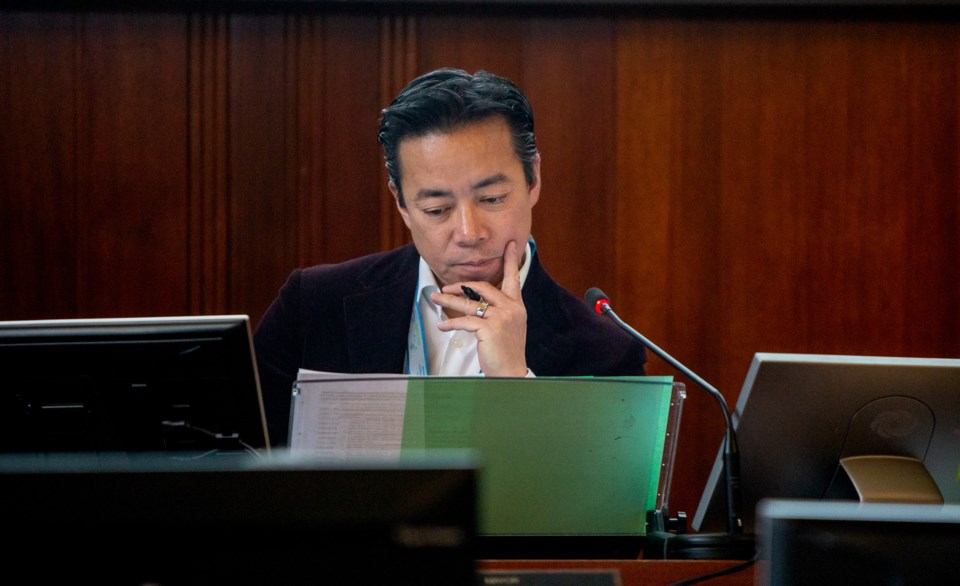Vancouver just received the kind of report no city should be proud of.
Its Integrity Commissioner has found that Mayor Ken Sim and (what were then) his seven ABC Vancouver Party councillors repeatedly breached the Vancouver Charter’s most basic requirement: that the people’s business must be done in the open. (One councillor, Rebecca Bligh, has since been ousted from the party.)
This isn’t about arcane law. Section 165.1 of the Charter is the very foundation of municipal legitimacy. It requires council to meet publicly, save for a few narrow exceptions. The idea is simple: decisions must be debated and shaped where citizens can watch, weigh in, and hold elected representatives to account.
The Commissioner’s report released Monday lays bare that this principle was treated as an inconvenience by the mayor and his team. Draft amendments to important policies—the Climate Justice Charter, Moberly Park funding—were worked out in private. Regular caucus meetings in the mayor’s office, conducted with a quorum, discussed council business in ways that moved decisions forward. Chats on the Signal app and personal email chains served as unrecorded, auto-deleting channels to hash out motions before they ever saw daylight.
The defence? That these were merely caucus discussions, not formal council meetings. That no votes were taken, so no harm done. That party politics at the municipal level give cover for the same kind of private strategy sessions common in Ottawa or Victoria.
The Commissioner, Lisa Southern, was having none of it. Her 68-page report concluded that what matters is not the label but the substance: if a quorum gathers, and city business moves materially toward decision, the law requires the public to be there. Otherwise, the public is shut out of the democratic process in a way that corrodes trust. “Super majority or not, party politics or not, Council must continue to do its work transparently,” she wrote.
Sim campaigned on transparency and accountability, but unlike his colleagues, did not sit for an interview with Southern. Twice scheduled, twice deferred, he eventually submitted written answers through counsel. He did the same last summer in the investigation of a complaint brought against him by Park Board Commissioner Brennan Bastyovanszky. (This one was brought by Green Party councillor Pete Fry and a member of the public.)
His refusal deprived the Commissioner—and more importantly, the public—of the chance to hear his direct account of what he knew, when he knew it, and why he condoned his caucus using private, encrypted channels to coordinate council business.
In plain terms, he, again, chose not to look the city’s watchdog in the eye. As Southern wrote: “Why keep to the shadows if what you are doing can be safely and fairly viewed in the transparency of daylight?”
After her earlier ruling that Park Board commissioners had violated the same Charter provision, ABC Vancouver’s response was not to change behaviour but to declare they would continue to caucus regardless. That prompted the B.C. Ombudsperson to warn the provincial government of a “disturbing repudiation of the rule of law.”
The party’s position amounts to: we will do what we like in private, even if the law says otherwise. It treated the Commissioner’s guidance as an obstacle rather than a guardrail.
But Southern wrote: “If Council Members meet with quorum outside of an open meeting, discuss City business, and do so in a way that moves that business along the spectrum of decision making in a material way, there is a problem—they are depriving the public of participation in the policy development and decision-making processes that serve to build public trust and confidence in local government. Democracy is undermined.”
When elected officials treat independent watchdogs as nuisances to be brushed off, Vancouver residents are left with no assurance that council decisions are the product of genuine debate rather than pre-cooked deals struck in the mayor’s office or on Signal chats that vanish into the ether.
The Commissioner could not recommend sanctions—seven councillors and the mayor were respondents, so no quorum of uninvolved councillors exists to impose penalties. The only consequence is publication of the report. It is a thin remedy for behaviour that undermined the city’s democratic credibility.
This is bigger than a Vancouver issue. B.C.’s Ombudsperson has urged the provincial government to close the loopholes and tighten enforcement. Local democracy cannot function if councils can simply shrug off watchdogs. The province should give integrity commissioners the power to compel records and testimony, and create real sanctions for breaches of the open meeting law.
Otherwise, politicians can hide their deliberations on encrypted apps, deny records, delay interviews, and escape with nothing more than a scolding report. The Commissioner has done her duty in documenting what happened.
This is not ABC’s best look, and a second look at the practice would be wise for them now. The Charter’s principle is something to honour. The public’s right to see its government at work is not a technicality, but the core of democratic legitimacy.
Kirk LaPointe is a Lodestar Media columnist with an extensive background in journalism. He ran for the Vancouver mayoralty in 2014, is a former CBC ombudsperson, and taught ethics and leadership at University of British Columbia for nearly two decades. He is vice-president in the office of the chair at Fulmer & Company.



